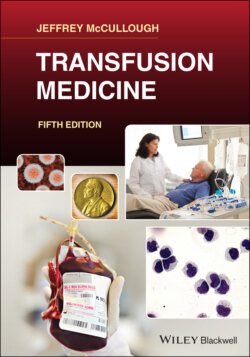Читать книгу Transfusion Medicine - Jeffrey McCullough - Страница 141
Thawing
ОглавлениеCryoprecipitate is thawed at 37°C, usually in a water bath. Care must be taken to ensure that the water bath is not contaminated and that the bags of cryoprecipitate are placed inside another bag (overwrap) to minimize the chance of contamination. When using cryoprecipitate, it is customary to pool several bags so that only one container is sent to the patient care area for transfusion. Some blood centers pool several bags of cryoprecipitate before freezing them; this is more convenient for the transfusion service because it eliminates the need to pool individual bags of cryoprecipitate after they are thawed. After thawing, the cryoprecipitate must be maintained at room temperature to avoid reprecipitation of factor VIII.
Table 5.9 Platelet additive solution component concentration (mM).
Sources: Modified from Gulliksson H. Platelet additive solutions: current status. Immunohematology 2007; 23(1):14–17; Alhumaidan H, Sweeney J. Current status of additive solutions for platelets. J Clin Apher 2012; 27:93–98; Vermeij J. Methods for preparing platelet products. WO 2016/014854 A1. Geneva: World Intellectual Property Organization International Bureau, January 28, 2016.
| InterSola(Fenwal) | Isoplatea(Terumo) | Composol(Fresenius) | Plasma Lyte A (Baxter) | SSP+(MacoPharma) | |
|---|---|---|---|---|---|
| Sodium chloride | 77 | 92.7 | 90 | 90 | 69 |
| Potassium chloride | 0 | 5 | 5 | 5 | 5 |
| Magnesium chloride | 0 | 1.5 | 1.5 | 3 | 1.5 |
| Sodium citrate | 10 | 0 | 11 | 0 | 10 |
| Sodium phosphate buffer | 26 | 0.5 | 0 | 0 | 26 |
| Sodium acetate | 30 | 27.2 | 27 | 27 | 30 |
| Sodium gluconate | 0 | 22.9 | 23 | 23 | 0 |
a Currently the only platelet additive solutions approved for use in the United States.
